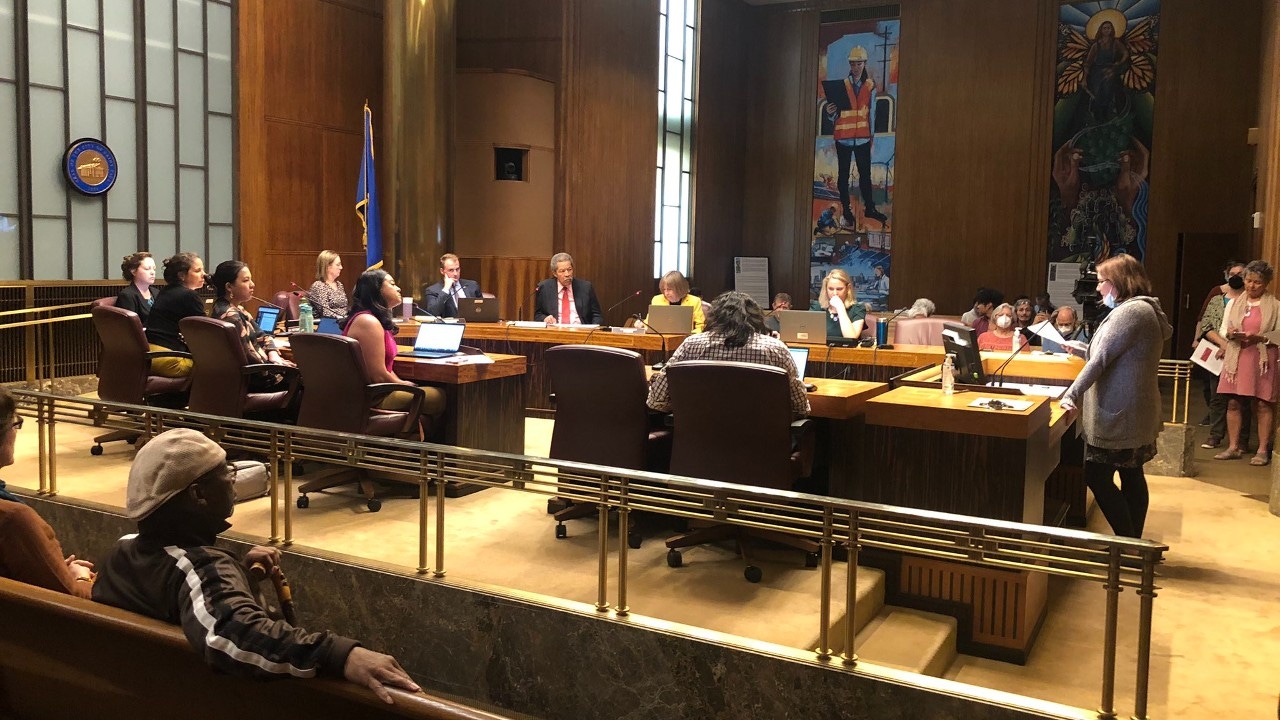St. Paul City Council passes changes to rent ordinance
[anvplayer video=”5136581″ station=”998122″]
The St. Paul City Council on Wednesday approved a package of amendments that overhauls the rent stabilization ordinance voters passed last year.
After hearing from more than a dozen residents who all spoke out against the revisions, council members voted 5-2 to overhaul the policy, with Council Members Nelsie Yang and Mitra Jalali voting no.
The version on the ballot in November capped yearly rent increases at 3%, regardless of a change in occupancy — one of the strictest regulations of its kind in the country. But earlier this year, the city established rules that let landlords apply for exceptions beyond the 3% limit.
Over the past several weeks, the City Council has heard from renters and housing advocates who have largely opposed the changes to the ordinance. They say the broad exemptions for new construction — which retroactively applies to units built in the past 20 years — and affordable housing gut the original policy and harm low-income renters.
An amendment passed before the final vote also lets landlords raise rent by a maximum of 8% plus the Consumer Price Index in the event of a “just cause vacancy,” defined as when a tenant chooses not to renew their lease or is removed for a certain set of violations.

St. Paul City Council members listen to residents' comments on proposed changes to the city's rent stabilization ordinance on Wednesday, Sept. 21, 2022. (KSTP/Callan Gray)
“What the amendments would do to the policy, it would displace and gentrify a lot of communities of color,” said Clara Ware, who lives in St. Paul. “My prediction is that evictions will take place immediately. Landlords are already raising rents more than 3%. My rent was raised more than 8%.”
She added, “What this amendment does is it dismantles the whole policy.”
Ware served on Mayor Melvin Carter’s 41-person Rent Stabilization Stakeholder Group, which included residents, city officials, landlords and developers. The group met weekly for months throughout the spring. In July, the stakeholders recommended the city pursue a 15-year exemption for new construction.
“It was, like, a waste of time for me to be in the task force,” Ware said. “I’m really upset.”
Other amendments brought forth by Jalali prioritized notifying tenants about potential rent changes beyond the 3% cap. One requires landlords to state in the application phase whether a unit is exempt from the cap, while another lets tenants know when their landlords have applied for an exception.
Council Member Chris Tolbert brought forward the initial package of amendments and praised the work of the council to reach a compromise.
“I think the ordinance and improvements we’ve made to it will hopefully carry out the issues that brought rent stabilization to the ballot of protecting renters, protecting against rent spikes and that, while also hopefully minimizing the negative consequences of the policy,” he said ahead of the final vote.
Jalali and Yang criticized the process, saying it undermined the work of housing advocates.
“What I hear over and over are people in our city saying to us they’re struggling,” Yang said. “Their wages are not increasing, but the cost of living is.”
Jalali said the 20-year retroactive exception for new construction would harm renters in her ward, where she says much of the city’s newest housing has been built.
“I will not vote to take rent stabilization away from my constituents that need it the most,” she said.
She also pointed out the 20-year period went beyond the 15 years proposed by the stakeholder working group.
Following the vote, residents shared their frustrations the amended version passed.
“Who is going to get 3%?” asked resident Katherine Banbury. “It exempts new construction for 20 years retroactive and it’s all affordable housing. No one is going to get the 3%.”
Mayor Carter told 5 EYEWITNESS NEWS he plans to sign the amended ordinance.
“This ordinance protects renters while helping construct the new housing units we need for the future,” Carter said in a statement. “I thank all the community members who helped craft this policy, and applaud the Council for passing it.”
The Alliance, a coalition of community organizations, issued a statement lambasting the “sweeping and dramatic changes” to the rent ordinance, saying the council’s vote on Wednesday “throws out the will of the voters.”
“Despite the council’s stated desire to expand affordable housing, Ordinance 22-37 will further entrench our current housing crisis by stripping protections for more than 20,000 people living in affordable housing and exempting not just new construction moving forward but buildings that have been built in the past 20 years,” the statement says, in part. “These changes will disproportionately harm the renters this policy was most intended and carefully crafted to protect: low-income, disabled, and Black, Indigenous, and People of Color (BIPOC) renters — the people who need renter protections the most.”